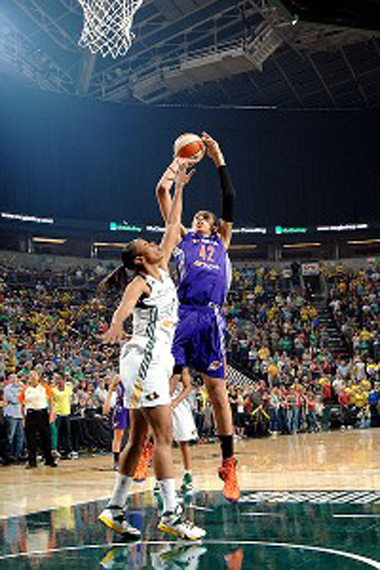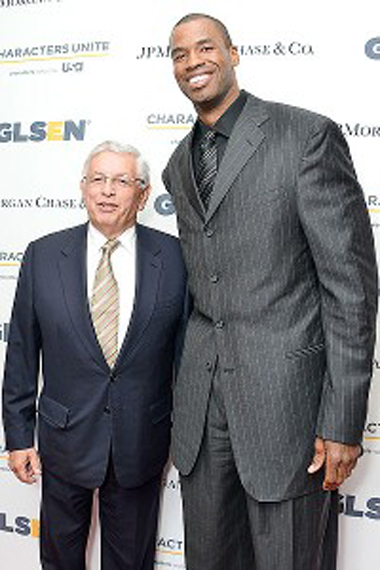By Kiese Laymon | Originally Published at ESPN. June 7, 2013 | Plenty has been left unsaid in locker rooms at every level | Photographic Credit; Dilip Vishwanat/Getty Images
The conversations we could be having about love, sex and religion
When I heard that Le Mont was trying out for the team, I got nervous. I didn’t so much worry about how James would treat Le Mont since the James was one of those “judge the sin, love the sinner” evangelical Christians who proselytized with love before, after and during every meal. I did, however, wonder if the rest of my team would tolerate a teammate who was openly gay.
A few months into the season, we all realized that our body fat was dropping. One day, after practice, a number of us crowded in front of the slender mirror in the locker room, and started comparing six-packs, delts, traps and other new muscles that had been previously playing peek-a-boo. I remember Le Mont maneuvering his way in front of the mirror, smiling and getting his Hulk Hogan on, too.
We died!
No one pushed Le Mont away. No one sucked his teeth. No one shook his head. You didn’t hear insecure utterances of “pause” or “no homo.” There was no talking in tongues. No quoting of levitical law. We all just kept laughing, kept flexing, and continued flirting with reflections that were, at least partially, sexier than they were one month earlier.
After practice that day, I remember telling my girlfriend that I witnessed American progress in that locker room.
A few weeks later, Le Mont quit the team.
I wasn’t sure if Le Mont tired of coming in last in the sprints, tired of rotating late on defense, or tired of getting chewed out by our coach. I figured that he tired of some of us annoyingly asking him if he was OK any time he struggled. It was possible that some of my teammates had words with him, but as far as I knew, Le Mont quit without saying a word to anyone.
In one of my classes later that semester, I read a story on American racial progress by James Baldwin. In an essay called “On Language, Race and the Black Writer,” Baldwin wrote, “The idea of American racial progress is measured by how fast I become white.” As a black boy from Mississippi, occasionally patted on the head by white folks for being “articulate” and often disciplined by the same folks for being “too much like my kind,” Baldwin’s work gave shape and definition to something I’d felt for years.
It was also rooted in the assumption that all of us in that locker room, except Le Mont, were “straight.” In a rush to distinguish myself as a decidedly anti-homophobic ally, I reduced Le Mont to a symbol. I patted myself on the head for never calling the symbol a gay slur, never adding a diminutive “e’ ” to his name, and never shying away from contact in the post. I asked him if he was OK, but never asked him, “How are you?” Hollowed out post-racialism and multiculturalism have since shown us that symbols are desperately used and rarely engaged, precisely because symbols have no imagination or capacity to reckon with past, present or future.
Unlike every other young man on that team, Le Mont could never talk honestly about sex in our locker room. He could never talk about how religion helped or hindered his understanding of sexual intimacy. He could never talk about the difference between loving someone and loving how someone made him feel. This is where the difference between “could never” and “chose not to” means everything, and nothing at all.
Long before Le Mont tried out for the team, my teammates and I talked a lot about heterosexual sex, curvy women and “spitting game.” We chose not to have meaningful conversations rooted in honest exploration of sexuality, sexual identity, love and intimacy partially because “choosing to” took way too much work, and had the potential to reveal shameful truths about our hearts and our imagination. Le Mont could never be as rhetorically loose and cowardly as we were. Yet we didn’t make a space for him, or us, to be rhetorically courageous either. We tolerated Le Mont, whom I later found out had come out to his parents at 16 and was cut off by them by the time he came to college, forcing him to work two jobs to pay his tuition. Le Mont deserved more than “tolerance” and the experience of being reduced to a symbol of American progress in that locker room.
Specifically, I listened to Chris Broussard, a beloved Oberlin alum and former Oberlin basketball player, go on “Outside the Lines” and say, “If you’re openly living in unrepentant sin, whatever it may be, not just homosexuality, whatever it may be, I believe that’s walking in open rebellion to God and to Jesus Christ.” He went on to say that he played on basketball teams with LZ Granderson, an openly gay writer for the ESPN who appeared opposite him on the show, “for years.”
Like a lot of Oberlin alums, I was initially disappointed. After a while, though, I realized that Broussard’s comments could have nudged us in the direction of tougher questions of athletes, and most importantly, a reckoning with ourselves. The fact that we chose to watch this as a media spectacle, clinging to “for” or “against” Broussard, says as much about us as it says about his understanding sexuality and the Bible.
In our clumsy rush to examine how much progress we’ve actually made in accepting gay and lesbian athletes, some of us made silly allusions to Jackie Robinson and failed to reframe the conversation around the much more meaningful personal questions.
If the national conversation about gay and lesbian athletes in sports is about sex, then let’s will ourselves to actually have that conversation. Why are we interested in athlete’s sex lives? Do we imagine athletes having the kinds of sex lives we want for ourselves? Are athletes having consensual sex? Is there room for explorations of pleasure in conversations about sex? Are athletes relying on unhealthy sex to make them feel better about themselves? Do teammates feel uncomfortable around teammates who engage in unhealthy, unprotected, nonconsensual sex? If professional sports locker rooms are filled with men having lots of unhealthy sex with lots of unhealthy partners, why does Rogers, Harris or Collins having sex with men even matter?
How would the national discourse on sexuality and identity change if every athlete were as courageous and thoughtful as Griner, who recently let Kate Fagan into her life at Baylor, while asserting, “I am a strong, black lesbian woman. Every single time I say it, I feel so much better.”
How would you?
And if this conversation is really about religion, then let’s have that conversation. Why selectively interpret the Bible, a collaborative text ripe with amazing explorations of love, to confirm conventional cardboard notions of masculinity and femininity? If professional locker rooms are packed with men and women who daily walk in rebellion to God in multiple ways, according to Leviticus 19 or 1 Timothy 6, and gossipy reporters who are paid to walk in rebellion to God, why is Collins’ or Griner’s open rebellion any more biblically spectacular than, say, Birdman’s tatted body or the shaven faces of athletes and reporters who refuse to look like James Harden?
I’m not making a point. I’m really asking.
How good are our favorite athletes at loving the other athletes in their locker rooms? How good are we at loving them? Is there a difference between loving someone and loving how someone makes you feel? How good are our favorite athletes at loving themselves? Is it hard to be good at giving and receiving love if you can’t be honest about with whom you’re having sex? Does having a lot of money make it harder to be good at giving and receiving love? Are any of our favorite athletes as good at loving as they are at their sport?
Are we ready to accept, as writer/activist Darnell Moore says, that gay and lesbian brothers and sisters aren’t so much “coming out” for the public to watch, judge and categorize, as much as “letting us in” to the paradoxes of their lives and loves? Should we all consider letting others in to these parts of our lives? How do any of us get better at loving if we rarely have honest conversations about what we want and expect from love and sex.
Baby steps, they say, are better than no steps at all. This is American progress. Still, though, I wonder. And mostly, I remember.
With or without Le Mont in our locker room, most of my college teammates and I avoided meaningful conversations about sexuality, intimacy, religion and love. And we were worse because of it. I’m guessing that this is still the reality in that specific Oberlin College locker room, in most living rooms, dining rooms, newsrooms and bedrooms in this country.
The courage of Le Mont Bennett, Griner, Collins, Rogers, Harris, Broussard, Granderson and the next professional athlete or journalist to partially welcome us into their sex, love and/or religious life should be met with sustained reciprocity, deliberate echo, caring questions, the best of American messiness — not convenient spectacle, regardless of one’s orientation.
“Y’all didn’t even want to know me,” Le Mont told me Thursday when we talked for the first time in fifteen years. Today, he’s a decorated disabled Army Veteran, an accomplished DJ and a graduate student at the University of Tennessee. “All I wanted was to feel included. I wanted to be a real part of that team. There was so much hurtful stuff that happened behind the scenes, and I wanted to talk about it, but I couldn’t. You have no idea how hard it was on that team, in that locker room.”
I’ve thought about that day when my teammates and I were flexing in that mirror a lot lately. I’m regretful. After the flex-off, I wish I would have sat my teammates down and told them that meaningful American progress might begin with the acceptance that our nation is obsessed with irresponsible sex; obsessed with talking dishonestly around race, class, ability, sexuality and gender; obsessed with tolerance but not acceptance; obsessed with avoiding how race, class, ability, sexuality and gender contribute to unhealthy athletic spectacle; obsessed with masking our dishonesty and desperation with lots of chest-thumping and flexing. We can change.
Most of my teammates would have looked at me like I was crazy as hell. Some might have walked out of the locker room. Le Mont would have stayed, though. James, now a senior pastor at House of Healing Outreach ministries, would have, too, he told me. The sharing all of our stories, and the questions that those stories produced, would have helped all of us passionately reckon with the cowardly Americans we were, and the courageously compassionate Americans we could become. We should have been better at loving each other.
That would have been American progress.
Kiese Laymon, born and raised in Jackson, Mississippi, is the author of How to Slowly Kill Yourself and Others in America and the novel Long Division. He has two new books, a novel called And So On and A Fat Black Memoir, forthcoming from Bloomsbury. He is currently an Associate Professor of English at Vassar College.
This piece was reprinted by EmpathyEducates with permission. We thank the Author, Kiese Laymon for his kindness, his heartfelt expression and for what we believe is a vital reflection.














Leave A Comment